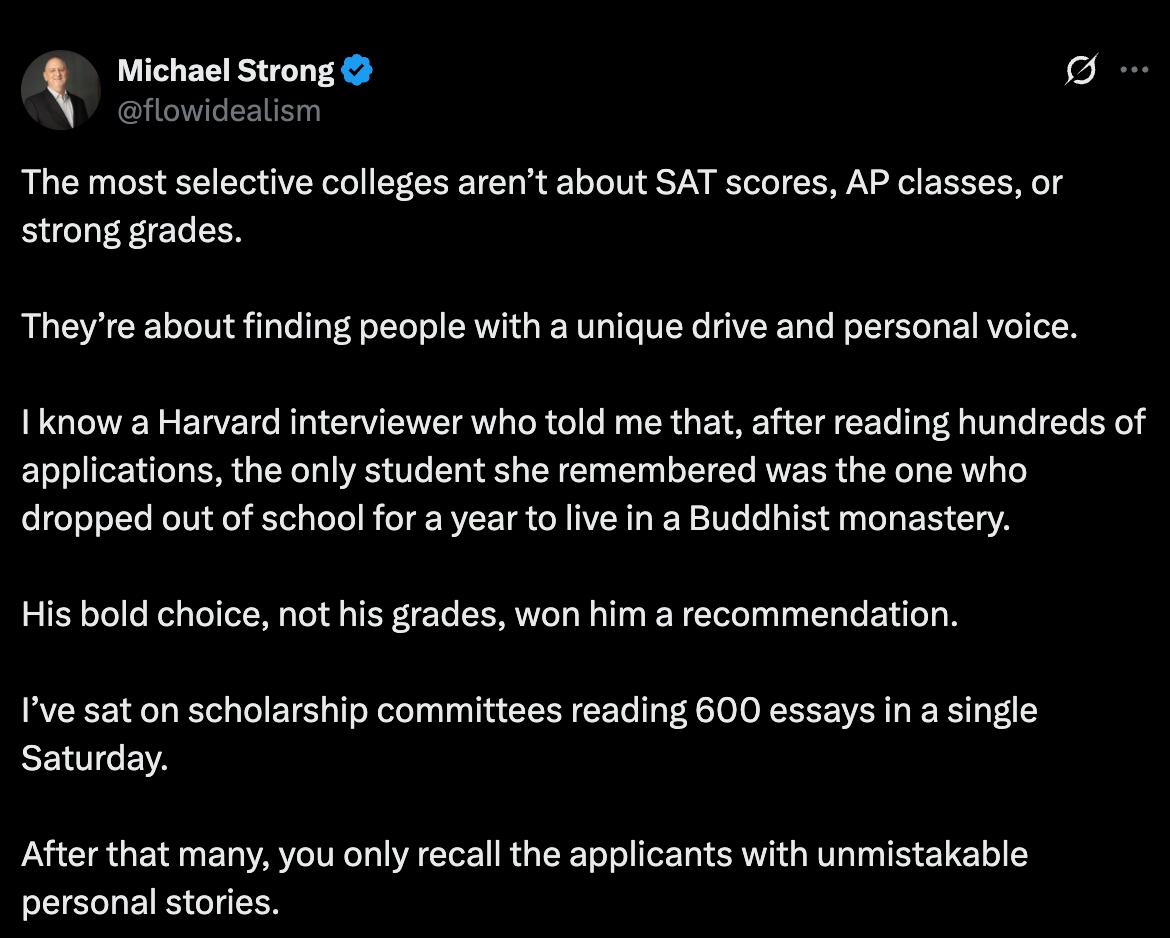Agency is eating credentialism
Having high agency is a personal moat in the future of work and life
Lately I’ve been thinking a lot about what it actually takes for someone to feel capable of steering their own life, especially when we talk about kids, or even ourselves.
High agency is something my husband and I talk about often at home but, most importantly, practice. When I think about some of the more challenging moments in my life, it was my own agency—not praise from others, credentials, or otherwise—that got me out of the circumstance or opened a new door.
Leaving teaching after years of working toward that goal was one of them. It wasn’t necessarily the sunk cost, but the identity I had formed around the profession and the people I was surrounded by at the time that made this decision a true test of self-worth. I had to believe that I could chart a new course for myself, find an angle to get through the door, and put in the work to come out ahead on the other side.
And that’s what I did, landing my first role out of teaching in an edtech startup.
The decision to choose and act, and give yourself permission compounds into a strong internal locus of control.
This reminds me of something Naval said recently in an interview:
“Self-esteem is the reputation you have with yourself.”
The more you act and take control of your circumstances, the more you can rely on yourself, no matter what curveball gets thrown.
Self-esteem breeds high agency and high agency leads to momentum. This is the moat we should all be optimizing for in the future of learning and work.
The future belongs to those who make it
Two great articles prompted this week’s piece:
An Age of Extinction is Coming by NYT columnist Ross Douthat argues survival of culture and tradition now hinges entirely on deliberate action, while Agency Is Eating The World from Gian Segato, a founding engineer at Replit, claims the future belongs to generalists who move fast, learn quickly, and ship often in an AI-driven era.
(I highly recommend reading both!)
Some key takeaways:
Survival now depends on intentionality, not familiarity: Culture, traditions, and meaningful experiences no longer sustain themselves; we must actively choose and deliberately protect what matters, or risk losing it entirely.
High-agency individuals are becoming the new archetype: With powerful tools like AI leveling the field, those who confidently act without instruction or validation increasingly shape the future.
Breadth sharpens instinct: In a world where specialization is being flattened by AI, those who see how systems interconnect are better equipped to navigate ambiguity and move across domains with smart judgment.
Education must train for agency and discernment, not just knowledge: If agency defines future success, schools must become genuine practice grounds where students regularly face real stakes and meaningful decisions.
Lived experience cuts through the noise: As credentials and automation create sameness, people who embrace unconventional paths or personal stories will increasingly stand out.
How we foster high agency at an individual level
Developing this internal state of mind does take people believing in you, a teacher, a parent, a spouse.
But more importantly, it requires people around you to trust you. I don't mean giving empty praise about your innate abilities and qualities, but to allow you to try things. Take risks. Make mistakes. And bet on yourself.
It’s why Montessori’s approach to work has always resonated with me, and likely played a role in my own relationship to agency. Montessori education is grounded in the belief that children build confidence not through praise or external validation but through meaningful work and independent action.
Through that process, children get to experience for themselves what it’s like to take control of their learning and, over time, build the confidence to do it entirely on their own and in more ambiguous or unfamiliar contexts. This gradually develops into a sense of high agency and true independence, where they feel that no matter the circumstances or uncertainty, they’ll be able to figure it out.
Optimizing for agency in education outcomes
If agency “is eating the world” like Segato claims, and we know how important this skill can be for longterm success and resilience, education should be prioritizing this as a key learning outcome, not a byproduct.
Measuring whether agency has been acquired or not is less straightforward than say, testing for a static math or literacy skill, since it’s gradual and situational. The last thing we need is for “agency” to be reduced to a checklist.
But what we can control is designing better environments that we know optimize for and can lead to higher agency in students.
Education should prioritize environments that foster agency through:
More unstructured play-based learning
Authentic decision-making and entrepreneurial projects
Embedding opportunities for reflection, risk assessment, and navigating ambiguity
Realistic career guidance emphasizing non-linear paths and mentorship
My own bias for action to build in education
It’s easy to talk about the problems and pontificate better solutions for education. What's more productive is to go build the solutions.
This topic of high agency has been especially top of mind as my husband Karel Vuong and I have recently left our previous roles to do exactly this: build urgently and create better education solutions for the world today’s learners are actually growing up in.
The future belongs to those who take matters into their own hands.
Everyone knows education is overdue for transformation. Discourse is important but it’s time for us to build.
We can’t wait to share more about what we’re working on soon!




Great identification on how Montessori education instills agency. My kids attended Montessori, and especially with my son, I see the agency vividly.
He’s got dyslexia and probably would have been labeled as ADHD in a typical school. Yet in Montessori, he was able to thrive. He loved story-telling and as he couldn’t (yet) write, he organized a “writer’s circle” where he told stories, and his 5- and 7-year-old friends did much of the writing. He’s always had an inquiring, scientific mind. So when he couldn’t read the science experiment cards in Montessori elementary, he recruited friends to read them to him. He then did the experiments, explained his observations and conclusions verbally to his friends, who wrote up the reports. In a traditional school none of that would have been possible: it would be considered cheating! But in Montessori, he learned that he can leverage his strengths to overcome his weaknesses. Instead of feeling dumb, he felt empowered.
Now at age 16, he’s still like that. He doesn’t like his public school, but it’s not getting him down. He tells me he loves learning, he just hates being taught. He just goes out and does things, like buying an old motorcycle and self-teaching how to restore it, and then sell it at a profit.
I shudder to think what his life would have been like, how his spirit would have been destroyed had we not sent him to Montessori school!
> Self-esteem breeds high agency and high agency leads to momentum.
Great metaphor, the "physics" of ones automotivation being the resilient "momentum" that drives you through your obstacles 👍